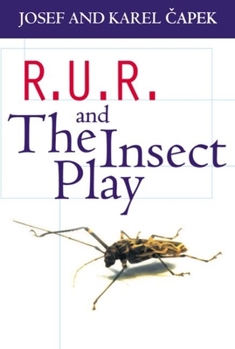R.U.R. and the Insect Play
Select Format
Select Condition 
Book Overview
Josef and Karel Capek were the best known literary figures of liberated Czechoslovakia after 1918. Josef won a considerable reputation as a painter of the Cubist school, later developing his own playful primitive style. He collaborated with his brother in composing sketches, stories, and
plays, as well as writing two short novels of his own and critical essays in which he defended the art of the unconscious, of children, and of savages. Following Hitler's invasion of 1939, Josef Capek was sent to a German concentration camp. He died at Belsen in April 1945. Karel Capek became a journalist and for a time stage manager of the theatre in Vinohrady. Though a writer of novels, visionary romances, travel books, stories, and essays, Karel is best known for his plays. His last plays, written just before the entry of Hitler into Czechoslovakia, deal with the
rise of dictatorship and the terrible consequences of war. Karel Capek died on Christmas day, 1938. After the success of R.U.R. (Rossums' Universal Robots, 1920) seen in London in 1923, the brothers collaborated in their best-known work, The Insect Play (1921). Both plays are satires depicting the horrors of a regimented technical world and the terrible end of the populace if they fail to rise
against their oppressors. They reflect the world in which the Capeks lived and give a commentary on its grosser follies.
plays, as well as writing two short novels of his own and critical essays in which he defended the art of the unconscious, of children, and of savages. Following Hitler's invasion of 1939, Josef Capek was sent to a German concentration camp. He died at Belsen in April 1945. Karel Capek became a journalist and for a time stage manager of the theatre in Vinohrady. Though a writer of novels, visionary romances, travel books, stories, and essays, Karel is best known for his plays. His last plays, written just before the entry of Hitler into Czechoslovakia, deal with the
rise of dictatorship and the terrible consequences of war. Karel Capek died on Christmas day, 1938. After the success of R.U.R. (Rossums' Universal Robots, 1920) seen in London in 1923, the brothers collaborated in their best-known work, The Insect Play (1921). Both plays are satires depicting the horrors of a regimented technical world and the terrible end of the populace if they fail to rise
against their oppressors. They reflect the world in which the Capeks lived and give a commentary on its grosser follies.
Format:Paperback
Language:English
ISBN:0192810103
ISBN13:9780192810106
Release Date:December 1961
Publisher:Oxford University Press, USA
Length:188 Pages
Weight:0.36 lbs.
Dimensions:0.6" x 5.1" x 7.8"
Customer Reviews
3 ratings
Insightful Plays That Have Aged Well
Published by Thriftbooks.com User , 20 years ago
Anyone who grew up immersed in science fiction (as I did) has likely heard of the play R.U.R. This play, written by a pair of Czech brothers, gave us the word and the concept of "robot." (R.U.R. stands for Rossum's Universal Robots.) It is unfortunate, however, that more people haven't read this play because it is very good.Written in the intellectual ferment between the world wars, R.U.R. tells the story of a world where mechanical robots (the Czech word for "worker") are taking the place of human workers. Though the human manufacturers of the robots all seem to have noble intentions (apart from the desire to get rich), things get out of hand when the robots revolt against their human masters and destroy the human race. The play ends with the hope for reinvention of the human race through the robots.Though first produced in the 1920's, it is amazing how little this play has become dated. There is an obvious formalism in the dialogue which places it in its period but the social themes and commentary remain pertinent for a modern audience. The vision Capek had which is so predictive of our modern relationship with science and invention is truly amazing. This is a play I would love to see produced.Allegorical and satirical, The Insect Play has also aged well though its lack of conflict makes it a lesser experience than R.U.R.; however, with its flighty "butterflies," miserly "beetles" and war-like "ants," The Insect Play is another bit of clever social commentary.
Historically brilliant, literarily flawed
Published by Thriftbooks.com User , 25 years ago
R.U.R. is an immensely important book for its contributions to our language and our perception. Equally, it is excellent commentary on the mechanization of work, and the quest to turn people into simple, perfect machines.Nonetheless, this translation falls short as literature. Devoid of irony and wit, and possessing only a simple, transparent plot, R.U.R. does not equal the standard set by Capek himself with "War with the Newts."
Fantastic
Published by Thriftbooks.com User , 26 years ago
In the play RUR, the brothers Capek coined the word Robot as meaning mechanical man for the first time. The play probes the ethical issues of humaniod robots and what constitutes humanity, life and the human soul and spirit. Written just before WWII the Insect Play is a wonderful fantasy full of political allegory and social commentary. It is important to keep in mind when reading the Insect Play that Josef Capek died in a Nazi concentration camp.






